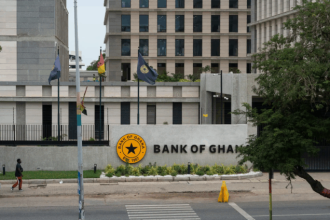The Ministry of Finance and the Bank of Ghana have been urged to collaborate and operationalise the Ghana Financial Stability Fund (GSFS) of ¢15 billion as soon as possible to mitigate and address solvency challenges facing eight local banks.
According to research by K B Frimpong and Dr. Richmond Atuahene, the General Framework of Ghana Financial Stability Fund must include a “one-time” financial package of measures tailored to specific requirements for each local distressed bank to restore solvency, and to provide sufficient capital.
The eight local banks, including Consolidated Bank Ghana, UMB, ADB, CalBank, Prudential Bank, Fidelity Bank, Omini BSIC, and GCB Bank signed onto the Domestic Debt Exchange Programme.
The total impairment losses due to the DDEP stood at ¢8.6 billion cedis captured in their 2022 Audited Financial Statements. The impairment losses of the five private domestic banks stood at ¢4.8 billion while the three publicly listed banks accounted for DDEP impairment losses of ¢3.8 billion.
The research advised that the Ghana Financial Stability Fund which could have an initial 5-year statutory life should be shared with the local banks in proportion to the losses they incurred in 2022. Initially, it could recapitalize all eight indigenous banks by transferring their capital losses at book value to the Bank of Ghana.
“The DDEP losses will be replaced with Bank of Ghana-issued GFSF bonds on behalf of Government of Ghana, which could yield 7%-9% per annum with maturities of between two and five years, where local banks will be required to repay for the bonds yearly from their business operations in respect of capital support receive from GFSF”, it explained.
The report alluded that the operationalisation of the Ghana Financial Stability Fund would enhance the capital base of local banks to undertake big-ticket businesses and support growth of Small and Medium Scale Enterprises that could have the potential to propel the country beyond the current economic challenges.
Secondly, the strong capital base serves as a buffer that will absorb losses and reduce the probability of bank failure. This it said protects bank creditors and, in systems with explicit or implicit public guarantees, taxpayers.
Thirdly, the report said adequate capital has a preventative role by improving incentives for better risk management.
In conclusion, the report reiterated that “the government, Ministry of Finance, and Bank of Ghana must ensure that the insolvent domestic banking institutions are adequately re-capitalized through the operationalization of the Ghana Financial Stability Support Fund which could support the private sector recovery”.
















